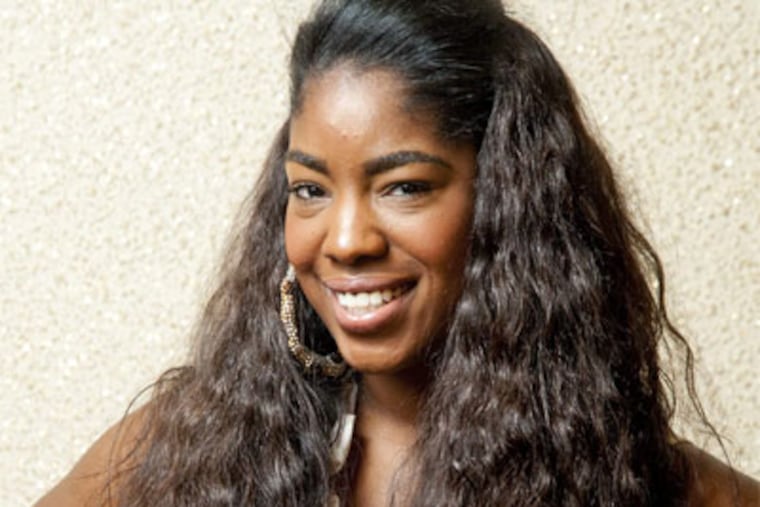Black women shifting to curly hair weaves
This summer, hair weaves are taking a turn for the kinky, the curly and the wavy. Why is this news?

This summer, hair weaves are taking a turn for the kinky, the curly and the wavy.
Why is this news?
When black women first started sewing hair onto their scalps during the 1990s en masse, the resulting shoulder-length bobs were as much about achieving a smooth texture as it was about having length. Fabulous hair was defined as long and straight.
However, as more black women have come to terms with their natural curl pattern, store-bought tresses are trending toward the fuzzy rather than the flat-ironed. Robin Givens' Boomerang straight has given way to Cynthia Bailey's The Real Housewives of Atlanta wavy.
That's progress — well kind of.
"African American women are giving up their relaxers, but they still want long hair," said Ellin LaVar of New York City's LeVar Hair Designs. LeVar is a weaveologist to the stars whose client roster includes Oprah Winfrey and Naomi Campbell. As for their embracing of curls, from a practical standpoint, women are tired of muscling their kinky hair into submission — a requirement for a straight weave to look natural. And natural locks — or the appearance of it — are gaining acceptance.
"They found the bone-straight hair didn't match their hair texture. This shift in packaged hair from straight to curly is definitely due to the natural hair trend."
I understand the love for long. And curly is certainly cute — and more authentic. But isn't it ironic that in order for black women to achieve a "natural look," they are doing it by using Asian hair? Although most weaves used to be synthetic, Chinese and Korean hair have become the must-haves. And the most popular — and most expensive — is unprocessed, or "virgin," Indian hair. It has a wave that varies from tight Afro-like curls to softer, more mixed-chicks hair.
"Indian hair mimics black women's hair most closely," explained Asya Richardson, 32, owner of Indian Princess Hair, and one of the few local African American hair importers in an industry that's dominated by Asians. Richardson imports virgin hair from India and sells shiny golden-colored packs of the wavy tracks to 107.9 radio host Kendra G as well as the wives and girlfriends of Philadelphia Eagles and 76ers players. (That includes Michael Vick's fiance Kiafa Frink and Thaddeus Young's betrothed, Shekinah Beckett. "You can wash it and straighten it. It's so versatile. You can use the same products in it. It's like using your own hair."
But it's not.
This reminds me of the movie Good Hair when comedian Chris Rock peddles a trash bag filled with African American hair to Asian beauty stores. The owners declare it undesirable.
But weave wearers argue their actions aren't about self-loathing. In fact, the new generation of black professional women, like publicist Carmena Ayo-Davies, insist they love their natural hair. Ayo-Davies doesn't use a relaxer, but she does have to constantly blow out her hair, especially because she regularly goes to the gym and gets photographed often. By purchasing hair from Richardson, she gives her own hair a break, saving her time from daily dillydallying.
Beckett, who wears her hair past her shoulders, has similar reasons. Her weave curls back up after washing, and looks like her natural hair. But unlike her natural hair, she doesn't have to consistently subject it to the heat of hair dryers and flatirons. "I can work out and do all the things I do without having to deal with it," she said. "It's low-maintenance."
Women will pay a lot for this luxury — one reason why importing hair is top-secret endeavor.
Ask a business owner where they find their hair, and they won't tell. After all, it's no small task to find the right supplier. In 2007, when Richardson, a former media ad saleswoman, started her business from her North Philadelphia home (www.indianprincesshair.com), she spent close to $20,000 searching for hair with the perfect weft, gloss and texture. Packs range in price from $265 for a 20-inch track to $340 for one that's 34 inches long. And while it takes about two packs for a complete look, this hair, unlike synthetic kinds, can be worn — taking it on and off for style changes or washing — for at least a year. With traits like these, several Philadelphia beauty stores have been the targets of shoplifting and burglaries this year, the perpetrators taking their curly weaves with them.
"I've watched this curly trend grow almost over night," said Terry Briggs, owner of Southwest Philadelphia Jaguar Luxury, another weave supplier in North Philadelphia. "A lot of my customers ask for it. I can't keep it in the store."
So, expect this to be the summer of the curly weave. On one hand, I'm excited. Any time women are willing to embrace their natural beauty, that's a good thing. But honestly, I can't wait for the day when women — especially African Americans — are comfortable with their curls, no matter how tight or loose.
Contact Elizabeth Wellington at 215-854-2704 or ewellington@phillynews.com, or on Twitter @ewellingtonphl. Read her blog, "Mirror Image," at philly.com/mirrorimage.